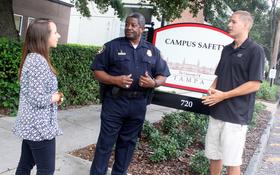A recent "addition to killing" essay written by a student at the Community College of Baltimore in Maryland has shaken the campus and left the student barred from attending classes. The essay, titled, "War is a Drug," refers to an addiction to killing that the student developed after serving in Iraq. Since the essay was published in the campus newspaper, the student, Charles Wittington, has been removed from campus until he receives a psychological assessment stating that he is not a danger to fellow students and staff at the college.
Wittington's Service
Charles Wittington was in the army infantry in Iraq from October 2005 to June 2007, according to a report at CNN. During that time, Wittington survived three attacks from improvised explosive devices, and he had to be medically evacuated out of Iraq in 2007. After Wittington's discharge, he was diagnosed with post-traumatic stress disorder and traumatic brain injury. He also lost a finger in one of the attacks. Currently, Wittington is on medication and receiving counseling to help him cope with the aftermath of his war experience.
Wittington did not find the transition from the armed service to civilian life an easy road. At one point, Wittington went on a drinking binge that resulted in him crashing a car and hurting a number of people. Wittington spent three months in jail for the incident, according to the Baltimore Sun. When he was released, he enrolled in Community College of Baltimore in an effort to turn his life around. At the time his essay was published, Wittington was earning all As in his classes and had never been thought of as a threat to any of the students or faculty on campus.
This video reports on the Wittington situation at the Community College of Baltimore.
Wittington's Essay
In his essay, Wittington wrote about how war and killing became a drug that eventually developed into an addiction. In an excerpt published at the Huffington Post, Wittington writes, "To this day, I still feel the addictions running through my blood and throughout my body, but now I keep myself composed and keep order in myself, my mind. War does things to me that are so hard to explain to someone that does not go through everything that I went through. That's part of the reason why I want to go back to war so badly, because of this addiction."
Wittington's words are painfully honest, and they earned him an "A" from his English teacher. The professor also encouraged Wittington to seek publication for his piece – which he did, in the campus newspaper. After the essay was published, the college found the content alarming and potentially threatening to the safety of the campus. Within a few days after publication, Wittington was called in to meet with college administrators who asked Wittington to remove himself from the campus until a thorough psychological evaluation could be conducted. The college also issued a notice of trespass that prohibits him from entering the campus or attending classes.
This video reports on Charles Wittington's essay.
Wittington's Side
Wittington was both surprised and frustrated by the school adminstrators' responses to his essay. He told ABC News, "I was really frustrated because they didn't give me a chance to explain. I wrote the paper to talk about the reality of what other soldiers go through and it was therapeutic for me." Wittington added that he has received counseling and is on medication for his PTSD. He also underwent the psychological assessment the college requested, and he is confident it will show that he is not a danger to anyone at this time.
Experts told ABC that it is not unusual for soldiers to become addicted to the adrenaline rush that typically accompanies combat. While that addiction can make it challenging to adjust to civilian life, it does not mean the former soldiers are prone to aggression necessarily.
The College's Response
Despite Wittington's assertions of his mental health, the Community College of Baltimore felt it had no choice but to dismiss Wittington from the campus until further assessments could be made. College spokeswoman Hope Davis told CNN, "When you look in the era of post-Virginia Tech and the content and the nature that he wrote about in the article, it caused us concerns. We had to take action against Mr. Wittington to ensure the safety of the college."
While Wittington was able to finish one of his community college courses online, he had to take incompletes in the rest of his courses because he could not attend class sessions. After his psychological assessment is presented, Wittington plans to return to school and complete his degree. However, he is not planning to return to Community College of Baltimore after this incident and will transfer his credits to another institution instead.
Questions? Contact us on Facebook. @communitycollegereview















